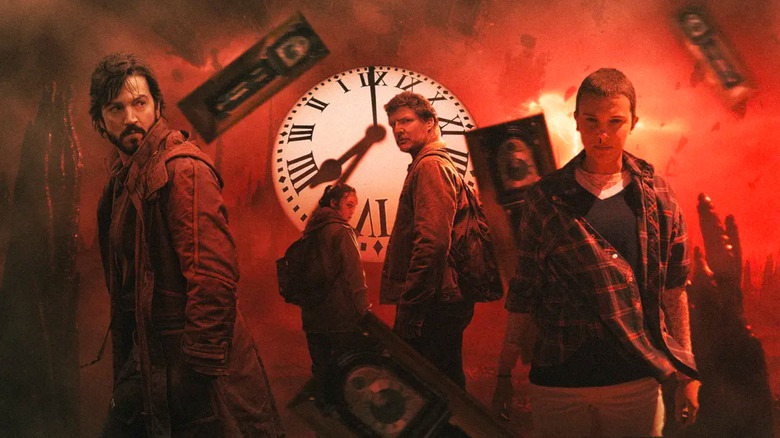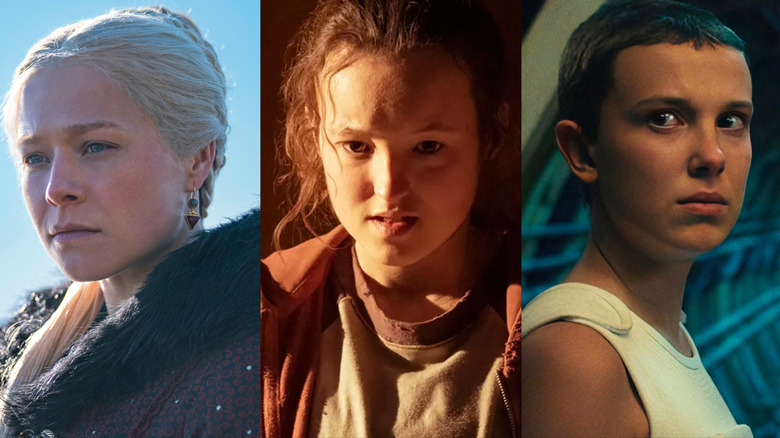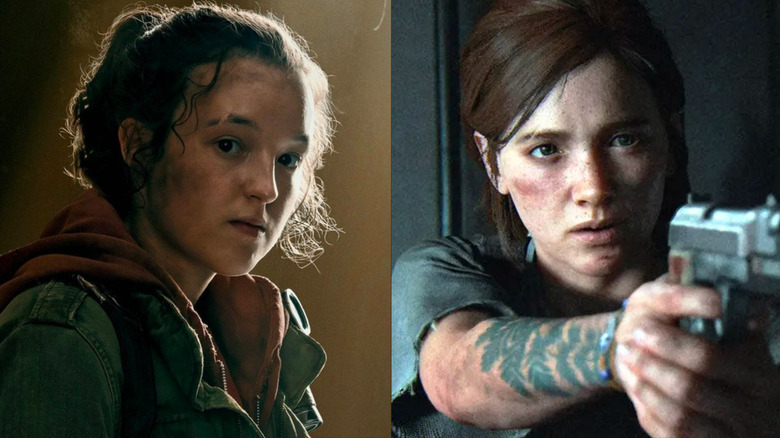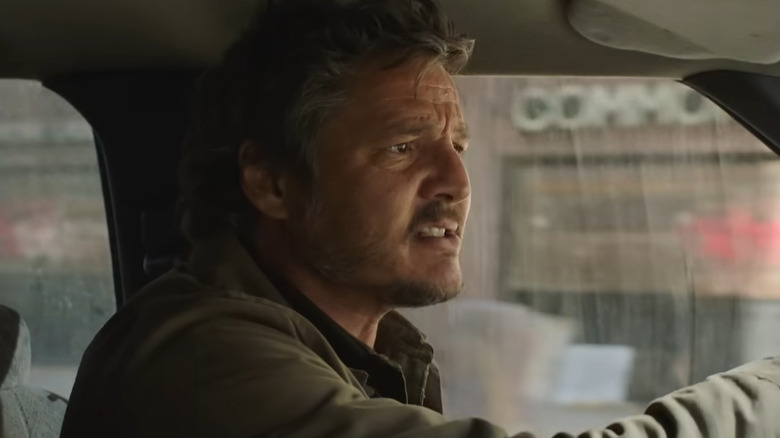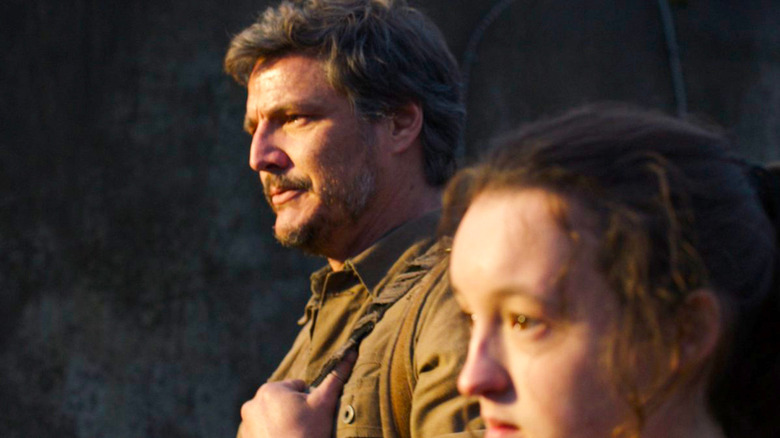The Last Of Us Season 2 Could Spark A Welcome Infection In Television
We're almost halfway through the first season of "The Last of Us," and after loving (and losing) television's new favorite couple, Bill (Nick Offerman) and Frank (Murray Bartlett), the biggest upset is that, eventually, our weekly excursions into the apocalyptic world of the best video game adaptation ever made will come to an end. Of course, those who are familiar with the critically acclaimed source material know — and have marked in their calendars, much like George R. R. Martin readers already were stressing about the Red Wedding from the moment HBOs "Game of Thrones" was announced — that there's far more heartbreak and chills to come.
Safe bets have already been made where Season 1 might leave Joel (Pedro Pascal) and Ellie (Bella Ramsay), with the only question being how things will be taken to the next level. With Season 2 officially confirmed to be carrying on the story of our weary pair of travelers, the estimations of what that story will entail — and who the focus will be on — are easy to make, if you know the games. With that in mind, there isn't really a question of "what" to expect in Season 2 — but rather, "when" we are going to get it.
Traditional logic would dictate that HBO should strike while the iron is hot, given the show's immense success. However, between high production values and previous examples of high-profile television, maybe this is a great opportunity for "The Last of Us" to mess with that formula. Maybe right now — with binge culture as demanding as ever, and world-building franchises constantly putting out new content — Season 2 of "The Last of Us" should defy expectations by leaving us hanging for longer than we want.
Waiting is now the hardest (and most wonderful) part of television
Sure, everybody wants to press that "next episode" button six times a night, but the success of today's biggest shows proves that viewers can be very patient when they have to be. Perhaps no show embodies that more than today's biggest watercooler program, "Stranger Things." The eighties throwback was big before, but in 2019, it took a three-year hiatus. This approach worked wonders when "Stranger Things" dropped back into the world with a blockbuster fourth season and a Kate Bush song to go with it, becoming Netflix's most-viewed English-speaking series ever (via Netflix). One of Netflix's other big swingers was "The Witcher," which, after debuting in 2019, didn't ride back into town until 2021 and was also met with an incredible 462.5 million hours of viewing time, as reported by Variety.
Even shows with tarnished records have made killer comebacks after proving that time away to recover can help. See: the "Game of Thrones" spin-off, "House of the Dragon," which overcame the disappointing finale of its predecessor to rake in a jaw-dropping 10 million viewers in its premiere. This proved that three years away from Westeros was enough to have audiences come running back, no matter what point in fictional history that might be. With that in mind, it's no wonder that other big-budget streaming shows are taking notes. The critical darling "Andor," according to The Wrap, probably won't hit screens again until 2024, with showrunner Tony Gilroy clearly wanting to take his time to get it right.
Ultimately, the second season of "The Last of Us" could push these boundaries even further, solidifying its place as event viewing. In fact, taking a time-out would positively impact the characters and their journey, if we look to the source material.
HBO should press PAUSE on Season 2 of The Last of Us
In the games, there was a seven-year gap between our first encounter with Joel and Ellie and their reunion in "The Last of Us Part II." First announced in 2016, the highly anticipated sequel eventually arrived in 2020 (albeit, with a mixed reception). The development period was in line with the fictional timeline of the game, which shifted its focus to Ellie at 19 years old, now on a journey that was just as deadly as the last.
Of course, HBO doesn't need to take as long to churn out another chapter of Joel and Ellie's story — but imagine if they did. Bella Ramsey, who is 19 years old in real life, plays Ellie at 14 in the first season. If the next series adapts the second game in the franchise, having such a big-time jump applied in the next year or so might hinder its longevity. Instead, why not return to Joel and Ellie around the same time as the games do, where the passage of time is clear, and neither characters need any other form of additional aging wizardry to display it?
Instead of feeding into the "now, now, now" mentality, Season 2 could hearken back to an old Hollywood routine that had mostly been forgotten, but provided major box office success in just the last year — that is, making people wait.
The Last of Us could take its time between seasons, like the beloved film franchises of yesteryear
There are a lot of James Bond movies, but the franchise once made viewers wait over five years to see the next one. If you were following the "Alien" movies, you had to wait even longer to see xenomorphs stifle screams in space. These long waits eventually got broken into three (or two) year delays between sequels, and the MCU has now made it standard fare to see characters appearing in other movies between their own big sequels, sometimes mere months apart (we're looking at you, Doctor Strange). The current rule of thumb for the big and small screens is to give people what they want, as much as possible.
However, it says a lot that 2022's biggest box-office films were an "Avatar" and a "Top Gun" sequel — two follow-ups that brought characters back who had not been seen in over a decade(s). Why couldn't the same success be applied to television?
If "The Last of Us" Season 2 takes time to allow its cast to age, and the characters they played to ferment in the public consciousness, it could really benefit the program's place in pop culture. This is a story where humanity is stuck in a world that has moved on without it, and those who remain are making a slow crawl to stay in existence. What would Ramsey's Ellie — a post-outbreak baby — look like if we returned to her years from now, instead of merely a year or two?
Is it a risky idea? Sure. But the result could pay off in a huge way.
Time is on the side of The Last of Us — let's keep it that way
Given that it took over a decade to see this fantastic world shift from polygons over to live-action, the development of "The Last of Us" has proven that moving at a dormant clicker's pace can pay off. It's been successful. Great! Now, let's not bleed it for all its worth, like so many other properties do. We don't want another "The Walking Dead" misfire, where a massive and beloved show slowly stumbles into the grave for a half-decade, hurting its historic legacy. You can't rush perfection, which is what this show — right now, with six episodes left — is proving itself to be.
If it did take a breather after the first season, "The Last of Us" could end up making viewers care even more about the characters, to the point where our reunion with them will be that much better. This is what made the second game, like it or not, so impactful.
It's taken a decade for general audiences to learn about — and become accustomed to — Ellie, fireflies, and world-shattering fungus. Now that we're here, what's another three years (or more)? Good things come to those who wait, after all.
